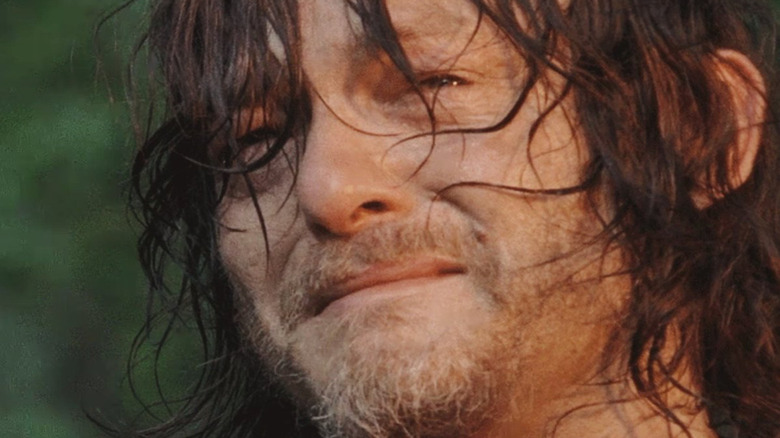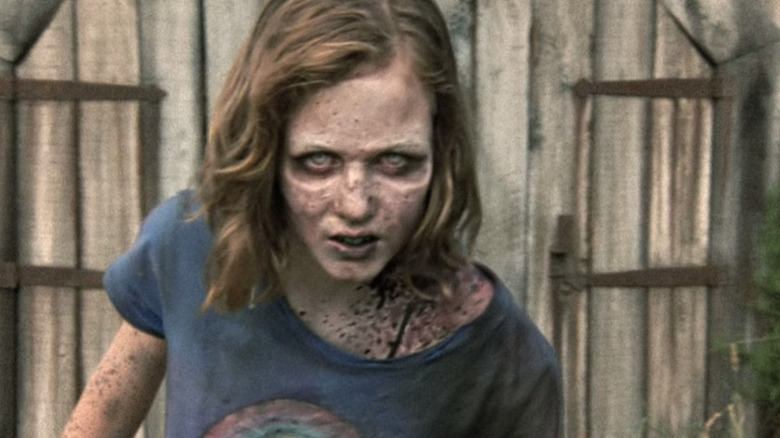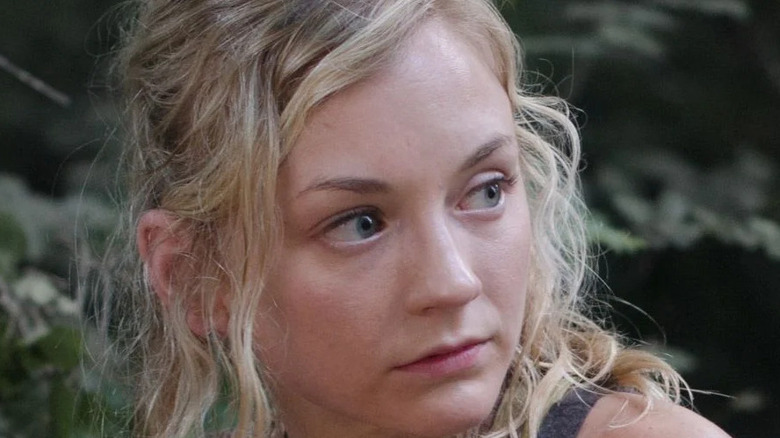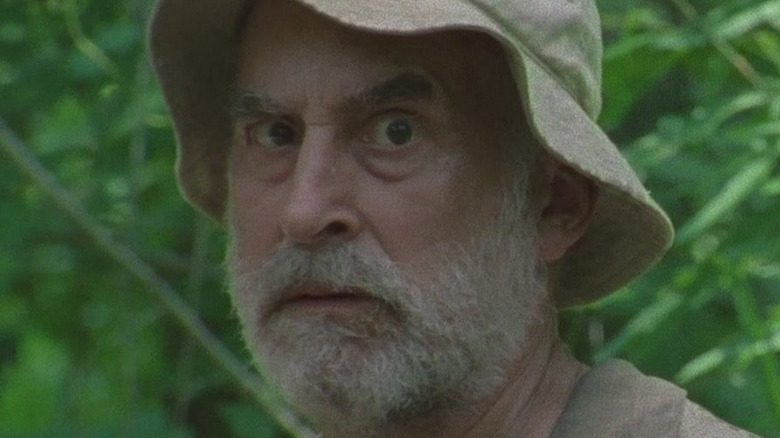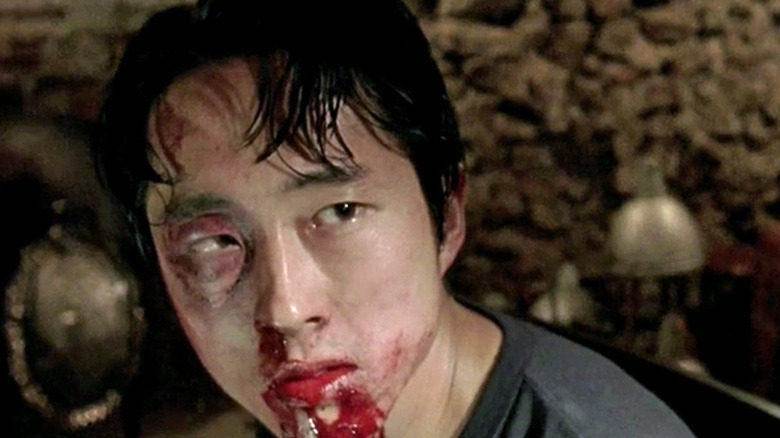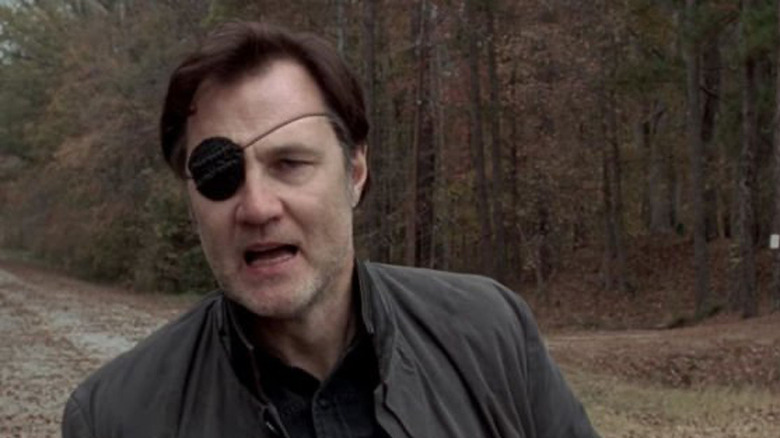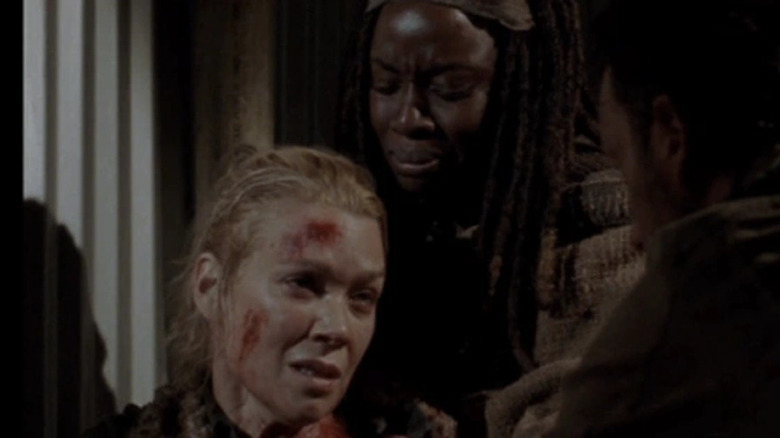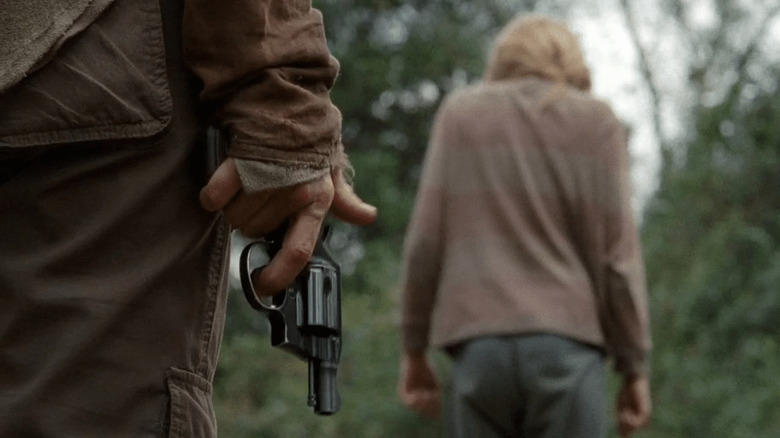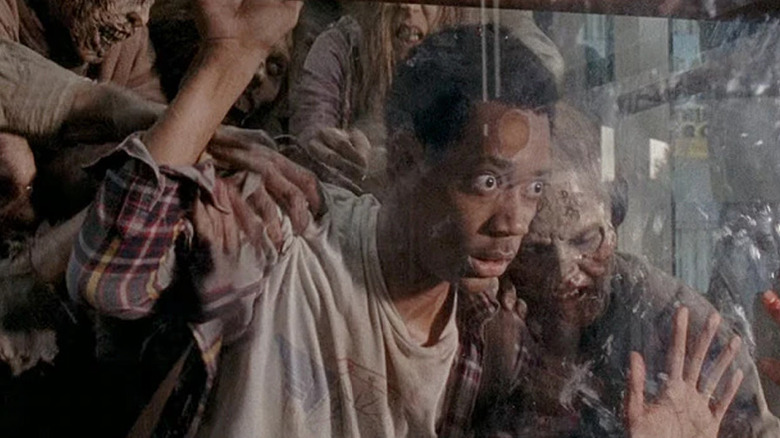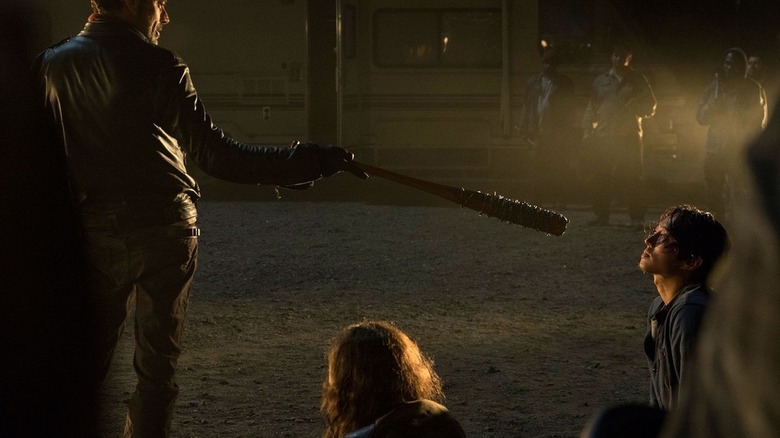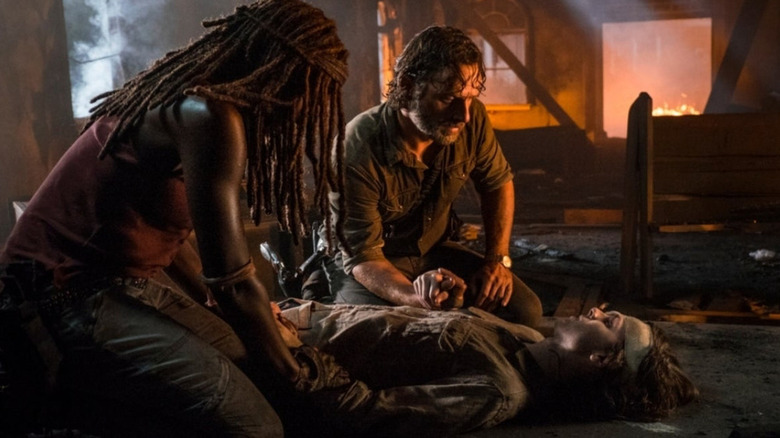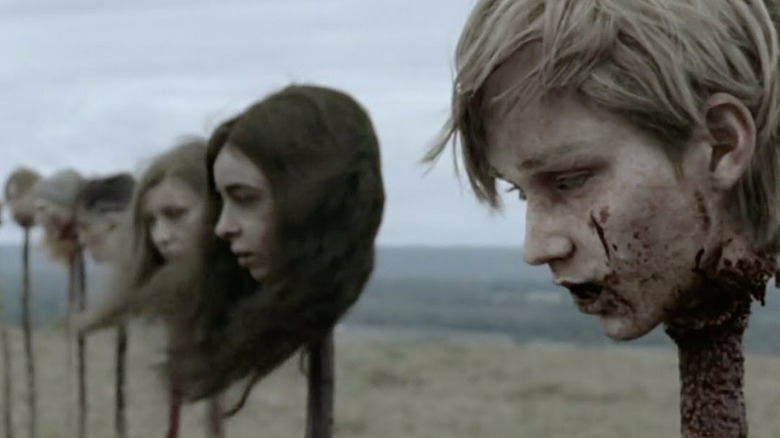Times The Walking Dead Went Too Far
There's no denying that the standards for what you can get away with on television have significantly changed over the past few decades. Both prestige and primetime cable shows push boundaries not just in their presentation and characters but also in their levels of violence. One show at the forefront of this is "The Walking Dead," which — since its 2011 debut — has been regularly delivering intensely violent sequences.
Many of the show's most passionate fans can attest to the show's unyielding presentation of violence and heartbreak. From character deaths to mass executions to various other gratuitous acts, "The Walking Dead" has become the master of stomachs — for better and for worse. Often, fans of the show vocalize their opinions whenever the show "goes too far," which is quite often. These are just a few moments that many fans feel crossed the line in terms of cruelty or violence.
Sophia emerges from the barn
When "The Walking Dead" returned for a second year, it was gaining major steam as priority content for many TV viewers. The show definitely knew this and severely stepped up its game for Season 2, going bigger and darker than before. Season 1 was undeniably melancholy, but the show was still figuring out its identity and was far from the binge-worthy juggernaut it would become. It's here that the show would cement its signature style and many of its recurring tropes and emotional rhythms. One of the first moments that exemplified this approach — to many fans' shock and horror — came when the show killed off a child.
Sophia Peletier, the daughter of Carol (Melissa McBride), was a minor but consistent presence in the show's 1st season. But her biggest contribution to the plot comes, unfortunately, after she goes missing in the first episode of Season 2. Lost in the madness of a walker horde on the highway, Sophia goes missing in the woods nearby Hershel's farm. This — in conjunction with Carl recovering from a gunshot — gives the group a reason to stay on the farm (much to some fans' chagrin). Eventually, Sophia resurfaces in the mid-season finale, "Pretty Much Dead Already," emerging from the barn fully transformed into a flesh-eating walker. This leads to Rick having to tragically kill her in front of Carol and everyone else, who react in shock and sadness.
Beth nearly takes her own life
In recent years, the topics of mental health and suicide have become more prevalent and normalized in mainstream pop culture. "The Walking Dead" often focuses on the mental states of its characters, and many going through the wringer mentally throughout each season. Season 2 — having an increased episode run at its disposal — used this to its advantage in terms of character moments. The season, jokingly referred to as the farm season, gave the characters a lot more downtime with non-walker-related moments. This resulted in a slower pace, especially when watched weekly, but it also allowed for smaller, more emotionally resonant character moments.
One of the more shocking moments is a very realistic scene where an emotionally distraught Beth considers taking her own life following the incident at the barn. This is intensified due to her mother Annette and half-brother Shawn being amongst the barn walkers that were shot. She even tries convincing her sister Maggie (Lauren Cohan) to take her own life with her. Andrea — in a rather confounding move — convinces Beth to go through with it in the hopes it'll dissuade her from any future attempts. This rather morbid idea works, but it's still an incredibly realistic moment amongst a show packed with high-concept horror content.
If you or someone you know is struggling or in crisis, help is available. Call or text 988 or chat 988lifeline.org
Dale's death
Season 2 proved to be a big transitional year for the show, as many aspects of its status quo were irreparably changed. Not only did the show gain several characters who would remain regulars for future seasons, but several show staples also made their exit. We mentioned Sophia earlier, and soon after, Dale Horvath (Jeffrey DeMunn) joined the pile of deceased characters along with her.
Dale served as an ethical and guiding presence for the group in the show's first two seasons, especially for Glenn and Andrea. Unfortunately, he exits the show in a very cruel way, having his innards partially torn open by a walker and leaving the group no choice but to put him out of his misery. His death near Season 2's conclusion definitely came as a shock for some fans, especially those who read the original comics. Dale from the show was in line with his printed counterpart aside from one major difference: he and Andrea were a couple.
Yes — as opposed to the show, where their relationship was distinctly a father and daughter-esque relationship, the comic's version was romantic. Whether or not the show would've led to this, we will likely never know, as DeMunn demanded his exit from the show following the firing of showrunner Frank Darabont.
Merle and The Governor torture Glenn and Maggie
Season 3 of "The Walking Dead" was big on torture sequences — especially with the introduction of Woodbury and its leader, The Governor. The show's first major use of torture would be showcased near the middle of Season 3 when Maggie and Glenn are kidnapped while on a supply run. Now hostages of Woodbury, both are immediately thrown in separate rooms to be mined for any useful information. Merle — recognizing Glenn instantly — proceeds to use his own brutal methods to extract information from the former pizza delivery boy. He not only beats Glenn within an inch of his life but also leaves him in a room with a hungry walker.
Maggie also finds herself at the mercy of the Governor, who — showing off his sick side — acts in a very predatory fashion. At first, he simply tries getting information from her verbally, but his methods quickly turn more disturbing. Maggie is forced to strip for him, and he places her in a very vulnerable pose on the table. Ultimately, both her and Glenn's respective tortures pushed the boundaries of the show in ways it hadn't at the point.
The Governor shoots his own people
The Governor was a very multifaceted character, identifiable but with an underlying psychosis and violent proclivities that never once wavered. David Morrissey brought equal amounts of charm, quiet menace, and violent sadism to the role, much to the delight of comic fans. After fully losing his mind — and his eye — partway through Season 3, The Governor begins planning his counterstrike. Ultimately, he coerces the citizens of Woodbury into becoming his militia and stages an assault on the prison. However, this initial attack is expected by Rick's group, which has ample firepower ready to successfully drive them back. The Governor doesn't take this loss well and takes out his frustrations in the most counterintuitive way possible — killing his own army!
This is one of the first noteworthy acts of violence courtesy of the Governor during his tenure as the show's big bad. It's also a major example of the show's unwavering dedication to piling up bodies at record speed.
Andrea's death
Inflicting prolonged suffering on character is a very risky move unless the final payoff makes the suffering ultimately worth it. After the suspenseful events of "Prey" — where she nearly makes it to the safety of the prison — Andrea finds herself at The Governor's mercy. Strapped to a chair alongside a severely beaten Milton, Andrea has nowhere to run or hide. The Governor gives the bloodied Milton a choice — either kill Andrea or die, and Milton chooses the latter. In a brave attempt, Milton tries to kill The Governor but ends up on the receiving end of the blade. Now Andrea is stuck in a room with a dead person en route to becoming a walker! She attempts to escape by using her feet to grab some pliers to aid her, but sadly, to no avail.
Although she dispatches the reanimated Milton, Michonne and Rick discover Andrea has been bitten and is clinging to life. It's a sad exit for the character, who fans definitely had a strained relationship with. Despite this, her death still felt needlessly cruel, especially since she'd been separated from the group since Season 2's conclusion.
Lizzie's death
"The Walking Dead" has racked up a disturbing body count of children and pre-teens in its decade-long run. The show has presented a brutal and cutthroat world where sadly, many don't live to see tomorrow. Sophia's death in Season 2 set a sobering precedent, but Season 4 definitely took it a step further. Lizzie (Brighton Sharbino) was first introduced as one of the new residents of the prison in Season 4. It was quickly revealed that Lizzie, to put it politely, had some serious issues, which spelled trouble for those around her. Indeed, her offputting habit of feeding the walkers dead rats would balloon into playing with them like twisted undead friends.
Lizzie's misguided argument was that they were still people who were stuck as misunderstood creatures in need of love. This disregard for reality would lead to her stabbing her own sister, Mika (Kyla Kenedy), to death in an attempt to prove her point. Knowing that they couldn't trust her around people, Carol and Tyreese — her de facto caretakers — decide her fate. Carol takes her out into the yard, and after tearfully telling her to look at the flowers, shoots her. It's an utterly disturbing moment, especially after watching Lizzie become increasingly further gone until she completely loses her grip on reality.
Noah's death
The show's proclivity for shocking character deaths became so ingrained in its DNA that it evolved into a regular occurrence. Even for characters who were only introduced for only half a season or so, which created a bizarre revolving door effect. Just as you would really be getting into a character, or the show would be giving them more depth, they'd die. This resulted in many characters' exits feeling hollow or — more often than not — needlessly cruel. This was most definitely the case for Noah, played by Tyler James Williams from the sitcom "Everybody Hates Chris."
Though it seems that in the "Walking Dead" universe, the appropriate name would be "Everybody Hates Noah," as even in the zombie apocalypse, he gets the short end of the stick. While raiding a store for supplies, Noah ends up in a revolving door with Glenn and another character named Nicholas. The latter selfishly saves his own skin, turning the door and leaving Noah stuck with a horde of walkers, who quickly devour him. It's a particularly cruel exit for a very likable character who was starting to get some welcome development. Sorry, Noah, we hardly got to know thee, and that's something that'll always be a source of disappointment for many fans.
Glenn and Abraham's deaths
When you talk about moments that the collective "Walking Dead" fandom declared as going too far, this is high on the list. The show's 6th season ended with a doozy of a cliffhanger — the group at the mercy of Negan (Jeffrey Dean Morgan). The barbwire bat-wielding, foul-mouthed psychopath had been teased throughout Season 6, and his introduction did not disappoint. This version of Negan walked on screen with a swagger and level of sadism on par with his comic book counterpart. However, it's his first major action that had the whole of the internet heartbroken following the Season 7 premiere.
In "The Day Will Come When You Won't Be," Negan — to make an example of Rick's group — claims two lives in a sickening fashion. To everyone's horror, he bludgeons both Abraham and Glenn to death within just a few minutes of each other. It was a visceral moment helped greatly by the direction of Greg Nicotero, whose special effects reign supreme in all their repulsive glory. As mentioned previously, this moment shocked the fandom to its very core and ensured a somber water-cooler conversation the following Monday. Did the show go too far? Potentially, but no one can deny just how impactful this moment was and the buzz that it created.
Carl's death
For some people, this was a "rage quit" moment in terms of their previously long-standing fandom for "The Walking Dead." Carl Grimes (Chandler Riggs) was one of the series' longest-running characters up until his abrupt exit in Season 8. This exit in question occurred while Carl was trying to save Siddiq, who eventually became the group's doctor. During this rescue, Carl found himself bitten, which meant he was on borrowed time. This came as an infuriating shock to the fandom, as Carl survived until the final issue of the comics.
Carl's final moments in the episode "Honor" show that even in death, he possessed ample strength. He shared these moments with his father Rick and Michonne, who'd become a guardian of sorts for him. He tells Rick what he envisioned for the future and hopes that his father can one day make it a reality. Ultimately, Carl opts to take his own life before he turns, ending his run as a main character. His death would be the primary catalyst for events to follow, but nonetheless, it left many fans gutted and aggravated.
Heads on sticks
Leave it to "The Walking Dead" to atom bomb its character roster just to show how insane its new villain is. Indeed, Season 9 would prove to be possibly the show's biggest year in terms of its various departures and developments. Not only did this season see the exit of Andrew Lincoln as the series protagonist Rick Grimes, but a new threat also emerged: the Whisperers, first identified incorrectly as Walkers that could talk and think. In truth, they are a group of zealots wearing the skin of Walkers and led by a figure known as Alpha.
Alpha quickly solidified herself as a force to be reckoned with, especially after creating a literal line in the sand. That line in question was marked with several characters' heads, which were chopped off and mounted on a row of pikes. Unlike in the comics — where several big characters like Ezekiel and Rosita are axed off — the show decides to kill off Tara, Enid, and Henry. It was a shocking reveal very in line with the original comic's visuals, and it left fans speechless.
